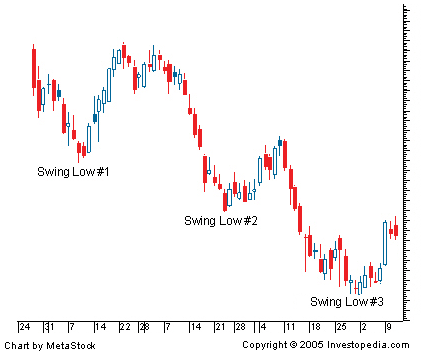Swing Low
A term used in technical analysis that refers to the troughs reached by an indicator or an asset's price. A swing low is created when a low is lower than any other point over a given time period. Successively lower swing lows indicate that the underlying asset is in a downtrend, while higher lows mean it is in an uptrend.

Swing lows are useful for an investor who holds a long position in an asset because swing lows can be used to determine strategic positions for a stop-loss order. One main tenet of the Dow Theory is that a if a major average breaks below a previous low, this movement can be interpreted as the beginning of a downtrend. In the case of an indicator, if it fails to make a new swing low while the price continues to decline, a divergence occurs which could mean that the downtrend is coming to an end.

Swing lows are useful for an investor who holds a long position in an asset because swing lows can be used to determine strategic positions for a stop-loss order. One main tenet of the Dow Theory is that a if a major average breaks below a previous low, this movement can be interpreted as the beginning of a downtrend. In the case of an indicator, if it fails to make a new swing low while the price continues to decline, a divergence occurs which could mean that the downtrend is coming to an end.
附件列表
词条内容仅供参考,如果您需要解决具体问题
(尤其在法律、医学等领域),建议您咨询相关领域专业人士。
如果您认为本词条还有待完善,请 编辑
上一篇 Swing High 下一篇 Symmetrical Triangle
